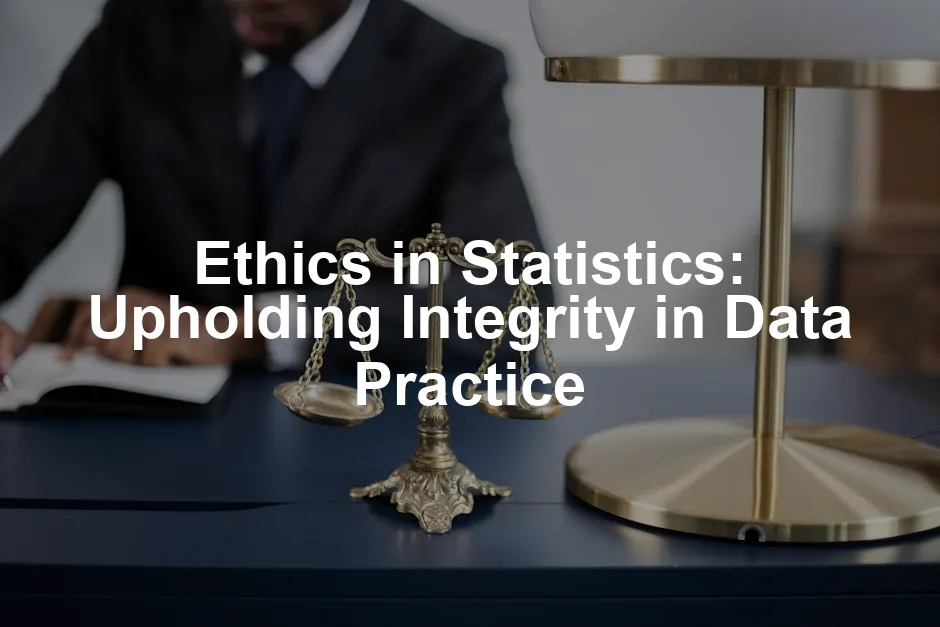Introduction
In today’s data-driven society, ethics in statistics is more crucial than ever. Statistics drive decision-making in healthcare, politics, economics, and beyond. With great power comes great responsibility, and this is where ethical practices play a pivotal role. Statisticians must navigate a landscape filled with data, ensuring that their work upholds integrity and fosters trust.
Ethics in statistics encompasses a set of principles that govern how data is collected, analyzed, and reported. Statisticians are responsible for ensuring their methods are sound, their conclusions are justifiable, and their findings are communicated transparently. They hold the torch of truth, guiding society through the murky waters of numbers and data.
Unethical practices can lead to disastrous consequences. Imagine a medical trial where data is manipulated to showcase a miracle drug. Such actions can put lives at risk and erode public trust in statistical findings. This is why organizations like the American Statistical Association (ASA) have established ethical guidelines. These guidelines serve as a roadmap for statisticians, outlining responsibilities and promoting ethical decision-making in their work. Statisticians must adhere to these principles, not just for compliance but to uphold the integrity of their profession.

Understanding the importance of ethical guidelines can significantly enhance a statistician’s career. Learn more about career opportunities with the American Statistical Association.
The Ethical Guidelines for Statistical Practice
Overview of the ASA Guidelines
The American Statistical Association (ASA) has set forth ethical guidelines to aid statisticians in making sound, moral decisions. These guidelines are essential because they provide a framework for statistical practice, which includes everything from data collection and analysis to interpretation and reporting. They ensure that statistical work is conducted with integrity, promoting accountability and transparency, which are vital in maintaining public trust.
These guidelines apply to all individuals involved in statistical work, regardless of their profession, job title, or educational background. Whether you’re a data analyst in healthcare, a statistician in academia, or a researcher in social sciences, these principles are relevant. They help practitioners navigate the ethical challenges that can arise in various fields, ensuring that statistical practices benefit society.
By adhering to these guidelines, statisticians can foster a culture of ethical behavior. This not only enhances the credibility of their work but also supports informed decision-making among stakeholders who rely on their analyses. The ASA guidelines are not mere suggestions; they are a call to uphold the highest standards in statistical practice.

Detailed Breakdown of the Principles
Principle A: Professional Integrity and Accountability
Professional integrity is the cornerstone of ethical statistical practice. Statisticians must take responsibility for their work and ensure they are competent in their methodologies. This means using appropriate techniques and being honest about their skills. For example, if a statistician feels overwhelmed by a complex project, they should not hesitate to seek help or additional training.
Accountability also means resisting the urge to manipulate data to fit desired outcomes. Practitioners should document their processes and be open to scrutiny. A classic example is when a researcher must acknowledge contributions from others, ensuring that credit is given where it’s due. By promoting a culture of integrity, statisticians can enhance trust within their communities.

To enhance your statistical knowledge and practice, consider reading “The Art of Statistics: Learning from Data” by David Spiegelhalter. It’s a fantastic resource that teaches you how to interpret data responsibly and ethically, while also being quite engaging!
Principle B: Integrity of Data and Methods
Integrity in data handling is crucial. Statisticians must be transparent about their data sources, biases, and limitations. This means clearly communicating the assumptions behind their analyses. For instance, when reporting findings from a study, practitioners should disclose any adjustments made for multiple comparisons.
Common pitfalls include selective reporting and data manipulation. To avoid these, statisticians should establish a protocol for data sharing and replication. If errors occur post-publication, they must be corrected promptly. This commitment to transparency not only safeguards the data’s integrity but also builds trust with stakeholders.

Principle C: Responsibilities to Stakeholders
Statisticians often engage with various stakeholders, including clients, subjects, and the broader community. Understanding their expectations is essential. Practitioners should avoid misleading stakeholders, even unintentionally. For example, if presenting exploratory findings, they must clearly distinguish them from confirmatory results to avoid misinterpretation.
By keeping stakeholders informed about the limitations of their work, statisticians can maintain trust. This role extends to educating stakeholders about statistical practices, helping them make informed decisions based on accurate interpretations of data.

If you’re looking for a great companion in understanding statistical methods, check out “Naked Statistics: Stripping the Dread from the Data” by Charles Wheelan. It’s a fun read that takes the fear out of statistics while providing practical insights!
Principle D: Responsibilities to Data Subjects
Ethical obligations toward research subjects are non-negotiable. Statisticians must prioritize the welfare of individuals involved in their studies. This includes obtaining informed consent and maintaining data privacy. For instance, when collecting personal data, practitioners should ensure participants understand how their information will be used.
Moreover, minimizing unnecessary data collection is vital. Statisticians should respect legal limitations on privacy and avoid exploiting vulnerable populations. By advocating for just treatment of all individuals, they uphold the ethics of statistical research.

Principle E: Responsibilities to Multidisciplinary Teams
Collaboration is the spice of life, especially in statistics! Statisticians often team up with professionals from various fields. This interaction can enhance research quality but raises ethical questions. Different disciplines may have varying ethical standards. Statisticians must prioritize their ethical guidelines, promoting open discussions about these differences. This ensures respect and understanding among team members. By fostering a culture of ethical collaboration, statisticians can contribute significantly to the project’s integrity, ensuring that all voices are heard and valued.

Principle F: Responsibilities to Fellow Practitioners
Mentorship is like the secret sauce in the statistical community. It enriches knowledge and fosters ethical practices. Experienced statisticians have a responsibility to guide newcomers. They should share insights on ethical decision-making and the importance of adhering to established guidelines. By creating an environment that encourages asking questions and sharing experiences, seasoned practitioners can help cultivate a generation of statisticians committed to integrity. This mentorship not only strengthens individual skills but also enhances the overall ethical landscape of the profession.

Principle G: Responsibilities of Leaders and Mentors
Leaders in statistical practice play a pivotal role in shaping ethical standards. They must create an environment where ethical practices are prioritized. This includes providing support for team members who uphold these values. Leaders should advocate for training and resources that promote ethical awareness. Additionally, recognizing contributions from all team members fosters a sense of belonging and encourages ethical behavior. By setting a strong example, leaders can inspire others to maintain high ethical standards, ensuring the integrity of statistical practices across the board.

Principle H: Potential Misconduct
Addressing ethical breaches is crucial for maintaining trust in statistics. Statisticians must be vigilant and aware of potential misconduct. This includes data fabrication, plagiarism, and other unethical practices. When misconduct is suspected, it’s essential to follow established procedures for reporting and investigating these claims. Maintaining confidentiality during investigations protects all parties involved. Moreover, fostering an environment where individuals feel safe reporting concerns without fear of retaliation is vital. By promoting transparency and accountability, the statistical community can safeguard its integrity and public trust.

Fostering Ethical Conduct
The Role of Education and Training
Incorporating ethics into statistical education is vital. By embedding ethical principles into the curriculum, educators equip future statisticians with the necessary tools to navigate complex moral dilemmas in their careers. Courses that focus on ethics in statistics encourage students to think critically about the implications of their work.
For instance, universities like Stanford and Harvard offer specialized programs that address ethical considerations in data analysis and interpretation. Additionally, online platforms such as Coursera and edX provide access to courses dedicated to ethical statistical practices. These programs not only improve understanding but also instill a sense of responsibility among budding statisticians, ensuring they uphold ethical standards in their future endeavors.

Training programs also play a pivotal role in reinforcing these values. Workshops and seminars that focus on real-world ethical challenges faced by statisticians help bridge the gap between theory and practice. By engaging in discussions about case studies or potential ethical breaches, statisticians can develop a robust ethical framework. This proactive approach is essential in fostering a culture of ethics within the statistical community.
If you want to dive deeper into the world of statistical principles, I recommend “Statistics Done Wrong: The Woefully Complete Guide” by Alex Reinhart. It’s an eye-opener that highlights common pitfalls in statistical analysis and how to avoid them!

Building a Culture of Ethics
Fostering ethical behavior within statistical organizations requires a multi-faceted strategy. First, creating an open environment where discussions about ethics are encouraged is crucial. This allows statisticians to voice concerns without fear of retaliation, promoting transparency and accountability.
Leadership plays a significant role in shaping this culture. When leaders prioritize ethical standards, it trickles down through the organization. For example, implementing ethical training sessions and providing resources can empower employees to make ethical choices. A strong commitment to ethics from management sets a positive example, encouraging all team members to follow suit.

Moreover, establishing clear ethical guidelines and policies is essential. Organizations should adapt the American Statistical Association’s ethical guidelines to fit their specific context. This ensures that everyone understands the expectations and can hold each other accountable. Regularly revisiting and updating these guidelines will also keep them relevant in an ever-evolving field.
Encouraging collaboration across disciplines is another effective strategy. By working with professionals from other fields, statisticians can gain new perspectives on ethical dilemmas. This collaborative approach fosters a shared commitment to ethical practices, reinforcing the notion that integrity is everyone’s responsibility.

Resources and Tools
A wealth of resources exists to support ethical practice in statistics. The American Statistical Association provides comprehensive ethical guidelines that serve as a foundational tool for practitioners. These guidelines outline principles that promote integrity, accountability, and ethical decision-making.
Additionally, organizations like the International Statistical Institute offer resources and best practices for ethical conduct in statistical work. Workshops, webinars, and publications can help statisticians stay informed about new ethical challenges and solutions.
Various tools can aid statisticians in adhering to ethical standards. Software that ensures data privacy and security is essential, particularly when handling sensitive information. Programs like R Programming Language and Python Programming Language have built-in libraries for data anonymization, which can help protect participant confidentiality.
Moreover, ethical review boards are invaluable resources. These boards assess research proposals to ensure they meet ethical standards before data collection begins. Engaging with these boards can help statisticians navigate complex ethical landscapes and secure the necessary approvals for their research.
By utilizing these resources and tools, statisticians can enhance their commitment to ethical practices. This commitment not only protects the integrity of their work but also fosters trust within the communities they serve. In the long run, fostering ethical conduct in statistics is not just a professional obligation; it’s a moral imperative that benefits society as a whole.

The Future of Ethics in Statistics
Emerging Ethical Issues
The landscape of statistics is evolving rapidly, thanks to big data, artificial intelligence (AI), and machine learning. While these advancements promise great potential, they also bring a slew of ethical dilemmas. For instance, big data can lead to biased algorithms that perpetuate existing inequalities. Imagine a hiring algorithm that favors candidates from certain demographics simply because of flawed training data. Statisticians must grapple with these biases, ensuring that their models don’t discriminate.
AI’s ability to process vast datasets can also obscure accountability. When an algorithm produces a result, who takes responsibility if that result is harmful? Statisticians need to establish clear ethical standards for AI applications, ensuring that they uphold the values of fairness and transparency. These challenges force statisticians to rethink their roles. They must become advocates for ethical considerations in the development and deployment of statistical models and algorithms.
Moreover, privacy concerns are escalating. With personal data becoming a commodity, statisticians face the ethical obligation to protect individuals’ rights. The challenge lies in balancing the need for data with the imperative to respect privacy. Statisticians should prioritize ethical data collection practices, ensuring informed consent and safeguarding sensitive information.
In summary, as technology advances, statisticians must be vigilant. They must address these emerging ethical issues head-on to maintain the integrity and reliability of their work. The future of statistics relies on their courage to confront these challenges.

The Growing Importance of Data Ethics
In today’s digital age, the demand for transparency and accountability in statistical practices is louder than ever. The public is no longer willing to accept data at face value. They want to understand how it was collected, analyzed, and presented. This shift marks a significant change in the relationship between statisticians and the communities they serve.
As data-driven decisions shape policies and influence lives, the call for ethical data practices becomes paramount. People expect statisticians to uphold high ethical standards. They want assurance that the data is not only accurate but also responsibly handled. This expectation fosters a culture of accountability. Statisticians must be proactive in communicating the methods and limitations of their analyses.
Organizations are also recognizing the importance of data ethics. Many are adopting frameworks to ensure ethical compliance in their statistical work. These frameworks guide practitioners in making ethical decisions, emphasizing the need for integrity, honesty, and respect for privacy. By prioritizing ethics, organizations can enhance their credibility and build trust with stakeholders.
As the demand for ethical practices grows, statisticians must embrace this evolution. They have the opportunity to lead the charge for ethical integrity in data practices. By fostering transparency and accountability, they can contribute significantly to a more trustworthy and informed society.
FAQs
Why are ethical considerations important in statistical research?
Ethical considerations safeguard participants’ rights and enhance research credibility. They help ensure that data is collected and analyzed responsibly, fostering trust between researchers and the communities they serve.
What are the main ethical guidelines for statistical practice?
The American Statistical Association has established ethical guidelines that emphasize professional integrity, data integrity, responsibilities to stakeholders, and obligations to research subjects.
How can researchers ensure ethical approval for their studies?
Researchers must submit their study proposals to an Institutional Review Board (IRB). The IRB reviews the research design and methods to ensure compliance with ethical standards and protection of participants’ rights.
What are some common ethical failures in statistics?
Common ethical failures include data manipulation, failing to obtain informed consent, and breaches of confidentiality. These actions can significantly undermine the credibility of statistical research.
How can statistical practitioners promote ethics in their work?
Practitioners can promote ethics by adhering to established guidelines, engaging in continuous education on ethical practices, and fostering open discussions about ethical dilemmas within their organizations.
Please let us know what you think about our content by leaving a comment down below!
Thank you for reading till here 🙂
For those looking to explore more on statistical ethics, consider “Ethics in Statistics: A Practical Guide” by David J. Hand. It’s a must-read for anyone serious about ethical statistical practices!
And if you’re into data science, don’t miss out on “Data Science for Business: What You Need to Know about Data Mining and Data-Analytic Thinking” by Foster Provost and Tom Fawcett. It will give you a solid grounding in applying data science ethically in business contexts!
All images from Pexels




